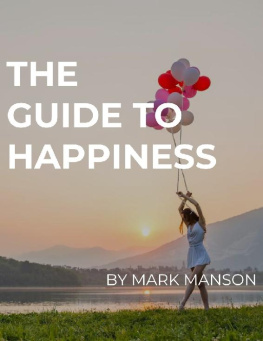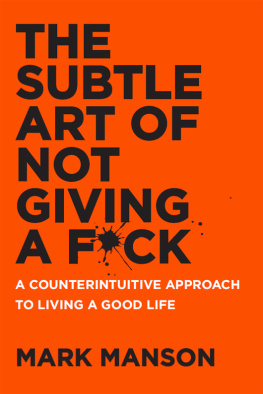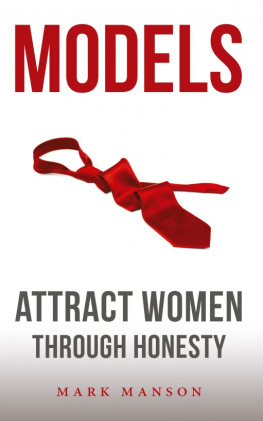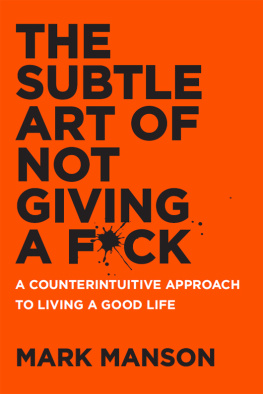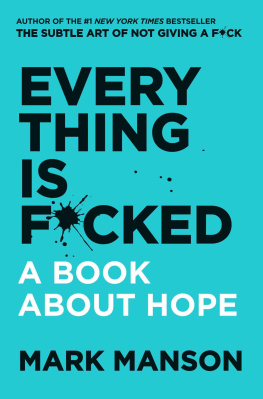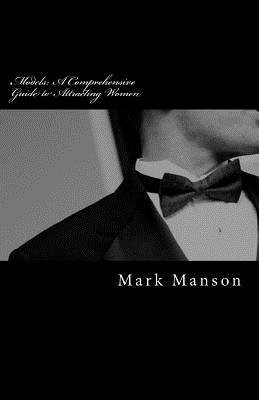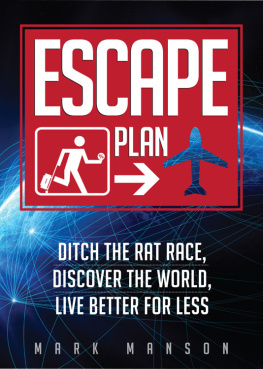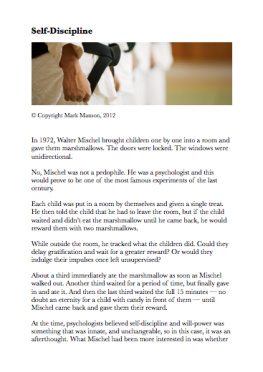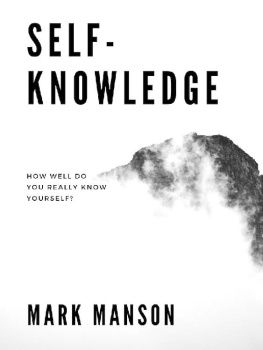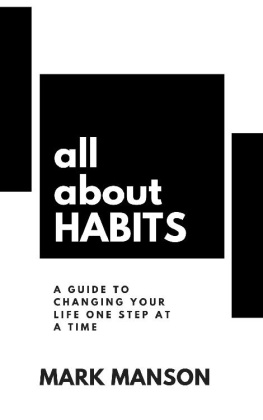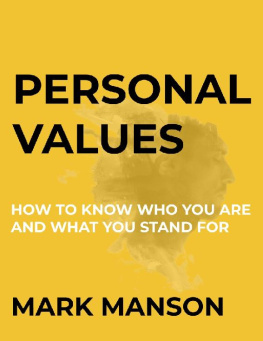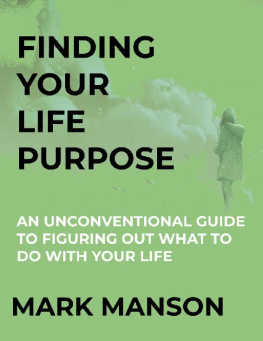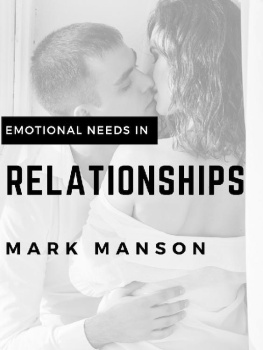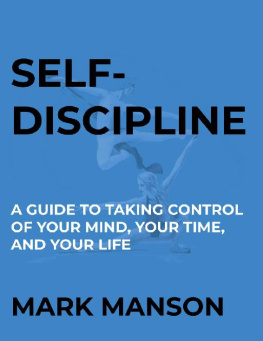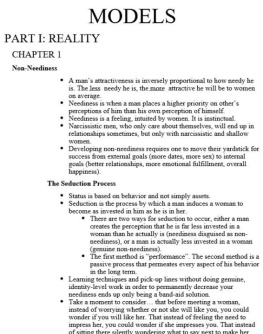Mark Manson - The Guide to Happiness
Here you can read online Mark Manson - The Guide to Happiness full text of the book (entire story) in english for free. Download pdf and epub, get meaning, cover and reviews about this ebook. year: 2018, genre: Religion. Description of the work, (preface) as well as reviews are available. Best literature library LitArk.com created for fans of good reading and offers a wide selection of genres:
Romance novel
Science fiction
Adventure
Detective
Science
History
Home and family
Prose
Art
Politics
Computer
Non-fiction
Religion
Business
Children
Humor
Choose a favorite category and find really read worthwhile books. Enjoy immersion in the world of imagination, feel the emotions of the characters or learn something new for yourself, make an fascinating discovery.
- Book:The Guide to Happiness
- Author:
- Genre:
- Year:2018
- Rating:3 / 5
- Favourites:Add to favourites
- Your mark:
- 60
- 1
- 2
- 3
- 4
- 5
The Guide to Happiness: summary, description and annotation
We offer to read an annotation, description, summary or preface (depends on what the author of the book "The Guide to Happiness" wrote himself). If you haven't found the necessary information about the book — write in the comments, we will try to find it.
The Guide to Happiness — read online for free the complete book (whole text) full work
Below is the text of the book, divided by pages. System saving the place of the last page read, allows you to conveniently read the book "The Guide to Happiness" online for free, without having to search again every time where you left off. Put a bookmark, and you can go to the page where you finished reading at any time.
Font size:
Interval:
Bookmark:
MARKMANSON.NET
2018
Mark Manson
The man who makes everything that leads to happiness depend upon himself, and not upon other men, has adopted the very best plan for living happily.
~ Plato
In June of 1997, Billie Harrell, a shelf stocker at a Home Depot outside of Houston, Texas, won the lottery. The prize was $31 million. Harrell was deeply religious and had struggled his entire life to provide for his wife, Barbara Jean, and his three children. The lottery seemed to be the pay off he and his family finally deserved after a long life of faith and sacrifice.
In July, he arrived in Austin to pick up a check for $1.24 million dollars, the first of 25 checks he was would receive over the next 25 years.
Billie bought himself a ranch and horses. He put money away to send his kids to college. He bought homes for members of his family. He donated money to his church. And two years later, in May of 1999, he locked himself in his bedroom, put a shotgun to his chest, and pulled the trigger. A confidant said that Harrell claimed, winning the lottery is the worst thing that ever happened to me.
********
Christopher Reeve was born in 1952 to a wealthy family in New York. Chisel-jawed and good-looking, Reeve split his young adult life between Ivy League schools in the US and sipping wine and riding horses around Europe. An aspiring actor, in 1978, Reeve hit his big break and scored the role of Superman in a big-budget Hollywood movie. He earned millions and became one of the most recognizable celebrities in the world.
Reeve made a fortune. He spent that fortune on nice houses, nice cars, luxurious parties and his passion for riding horses.
Then in 1995, Reeve fell off a horse and cracked two vertebrae in his spine. He would never walk or breathe on his own again.
Reeve became an advocate for the disabled and spent the rest of his life fundraising for spinal cord research. He was the first celebrity supporter of stem cell research. Reeve later claimed that his accident helped him appreciate life more. It wasnt a joke. He noted that there were able-bodied people more paralyzed than I am, and once remarked, I can laugh. I can love. I am a very lucky guy.
********
Human happiness is a perplexing topic to delve into. It would seem obvious but its not at all. So the first part of this guide will deconstruct happiness: what it is, how we experience it, how we perceive it. Chances are this will blow your mind. But from there well pick up the pieces (of your mind, that is) and put together ways you, me, or anyone can experience happiness more often.
Most of your assumptions about happiness are likely wrong. For one, psychologists have found that were terrible at perceiving our own happiness and estimating what will or will not make us happy. So if natural disasters, culture, gender and income arent reliable predictors of our happiness, what is?
There are a few guiding principles we can learn to be happier and stay happier in our everyday lives. Thats what this guide is about: what you can do right now to start improving your overall quality of life. Call it The Guide to Being Slightly and More Consistently Happier if youd like.
Lets get into it.
Don Draper of Mad Men fame stated in one of the series final episodes that the definition of happiness is the moment before you need more happiness. As cynical as it is, the brilliance of this line lies in the fact that we rarely notice happiness while were experiencing it, we only notice a lack of it once its gone.

Don Draper, dishing out happiness since 1960.
In psychology, the concept Draper speaks of is referred to as loss aversion, and it states that, on average, the pain of losing something is three to four times greater than the happiness of having it. According to studies by psychologist Daniel Kahneman, humans consistently overestimate the value or pleasure of what they dont have and overestimate the pain or loss of losing something they do have. Everyone is wired this way.
And not only do we feel the pain of losing something to be greater than the joy of having it, but loss aversion works in reverse as well. We estimate the happiness of acquiring something we dont have to be far greater than the pain of remaining without it. So not only do we experience the pain of crashing our favorite car to be far worse than the joy of buying it, but we also estimate that buying a new car will be far more enjoyable than the pain of crashing it. It seems were wrong both ways. And for whatever reason, Mother Nature wanted it this way loss aversion seems to be evolutionarily programmed into us.
Now, before I ruin your day (this is an article about happiness after all), the reality of loss aversion has an important lesson buried within it a lesson extremely applicable to how we choose to lead our lives and how happy we are as a result:
We are terrible judges of knowing what makes us happy or unhappy.
In fact, not only are we horrible at predicting what will make us happy or unhappy in the future, but the research of Harvard Psychologist Dan Gilbert has repeatedly shown that were bad at remembering what made us happy or unhappy in the past as well.
For instance, in one study, they asked supporters of two presidential candidates (George W. Bush and Al Gore) how happy or unhappy they expected to be if their candidate won or lost. Then a month later, after Bush won, they went back and asked people how happy or unhappy they were about the outcome. Bush supporters were less enthused than they expected to be and Gore supporters were less upset than they expected to be.
But heres the kicker: five months later, psychologists asked the same people how happy/upset they remember being after Bush won, and across the board people exaggerated how they had actually felt at the time.
Bush supporters remembered being happier than they were, and Gore supporters remembered being more upset than they were. It seems that our estimations of how happy/unhappy we are become more and more exaggerated the further away from the present they occur.
This means that horrible family trip that we hated so much as a kid probably wasnt as bad as we thought it was, and winning the Call of Duty 4 tournament we practiced so hard for wont actually be as enjoyable as we expect. The reason for this is that our minds arent capable of remembering every tiny detail of experience, nor are they capable of predicting every detail of experience either. As a result, our mind takes the general vision of an experience (past or future) and fills in the blanks . If what we remember was somewhat painful and unenjoyable, we just assume that all of it was painful and unenjoyable. If, in our future fantasies, all we can imagine are the enjoyable and exciting aspects of an experience, our mind goes ahead and fills in the blanks and assumes everything about the situation will be great.
This matches up with my own experience. When I was broke and struggling, working 12-16 hours a day to get my business off the ground so I could travel the world, I assumed I would be blissfully happy once I did. And granted, Ive been pretty damn happy traveling around the world the past few years. But there are a whole host of problems and drudgery to this existence that I couldnt fathom when I was slaving away for my dream: the language barriers, cultural differences, difficulty making new friends, stresses of poor economies, losing luggage, visa problems, strange illnesses, and on and on.
Next pageFont size:
Interval:
Bookmark:
Similar books «The Guide to Happiness»
Look at similar books to The Guide to Happiness. We have selected literature similar in name and meaning in the hope of providing readers with more options to find new, interesting, not yet read works.
Discussion, reviews of the book The Guide to Happiness and just readers' own opinions. Leave your comments, write what you think about the work, its meaning or the main characters. Specify what exactly you liked and what you didn't like, and why you think so.

